Rare Books and Special Collections, Firestone Library, Princeton University
Opening October 13, 2006
All work from the Leonard L. Milberg Irish Theater Collection, unless otherwise noted
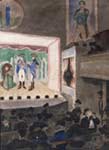 Jack B. Yeats (1871-1957). “Willy Reilly at the Old Mechanics’ Theatre.” Courtesy of the Abbey Theatre.
Jack B. Yeats (1871-1957). “Willy Reilly at the Old Mechanics’ Theatre.” Courtesy of the Abbey Theatre.
This is the image used on Princeton University’s Players & Painted Stage poster. In 1855, the Irish writer William Carleton published Willy Reilly and His Dear Colleen Bawn: A Tale Founded upon Fact about an Irish Catholic man who loved a Protestant heiress. The popular story was soon rewritten as a melodrama for the stage. This Yeats watercolor shows a scene from the play being performed at the Mechanics’ Theatre, Dublin, which two years later became the Abbey Theatre.
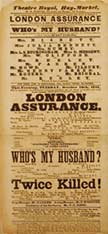 Dion Boucicault (1820-1890). London Assurance, broadside. London: Theatre Royal, Hay-Market, 1847.
Dion Boucicault (1820-1890). London Assurance, broadside. London: Theatre Royal, Hay-Market, 1847.
Actor and playwright Dion Boucicault was the author of approximately 150 original plays, adaptations, and translations. Born in Dublin, Boucicault achieved his first theatrical success when he was only 21 years old with London Assurance. This comedy premiered at the Theatre Royal, London, March 4, 1841.
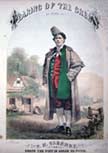 Wearing of the Green, sheet music. New York: S.T. Dodworth, 1865.
Wearing of the Green, sheet music. New York: S.T. Dodworth, 1865.
The lithograph on the cover of this sheet music shows the American actor T. H. Glenney as the character Shaun the Post in Dion Boucicault’s Arrah-Na-Pogue [Arrah of the Kiss]. The music was published in conjunction with an 1865 production of the play at Niblo’s Garden, New York.
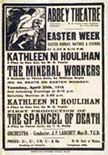 Abbey Theatre poster. Dublin: Abbey Theatre, 1916.
Abbey Theatre poster. Dublin: Abbey Theatre, 1916.
Poster for the 1916 Easter Week performance of Kathleen ni Houlihan and The Mineral Workers with a change of program on April 25, 1916, when the advertised performance was canceled due to the Easter Rising. Courtesy of Leonard L. Milberg.
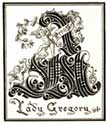 Lady Gregory (1852-1932). Bookplate in William Butler Yeats, Plays for an Irish Theatre. Vol. 2. London: A. H. Bullen, 1904.
Lady Gregory (1852-1932). Bookplate in William Butler Yeats, Plays for an Irish Theatre. Vol. 2. London: A. H. Bullen, 1904.
This book was inscribed by Yeats to “Lady Gregory from her friend the writer of something of this book–March 1904.” On the following flyleaf is a 14-line poem by Yeats, “Song for pupils at end of Hour Glass.” Courtesy of Leonard L. Milberg.
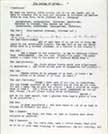 Sean O’Casey (1880-1964). The Cooing of Doves: A Converzatione in One Act, typescript.
Sean O’Casey (1880-1964). The Cooing of Doves: A Converzatione in One Act, typescript.
An unpublished play submitted to the Abbey Theatre in 1923, at the same time as O’Casey’s Kathleen Listens In. The play was rejected but later used by the playwright as the second act for The Plough and the Stars in 1926. A complete, edited transcript is published in the Princeton University Library Chronicle (Fall 2006-Winter 2007). Courtesy of Leonard L. Milberg.
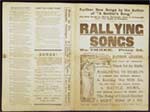 Rallying Songs, no. 3. Dublin: The Art-Depot, [1917-18].
Rallying Songs, no. 3. Dublin: The Art-Depot, [1917-18].
This rare broadsheet contains lyrics by Sean O’Casey (Séan Ó Cathasaith), as well as those of Peadar Kearney (Peadar Ó Cearnaigh), Maeve Cavanagh, Countess Constance Markievicz (Caonstance de Markievicz), Joseph Crofts, and others.
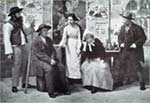 Lady Gregory (1852-1932). Spreading the News, production photograph reproduced in Irish Plays, prospectus. [Dublin: Abbey Theatre], 1906.
Lady Gregory (1852-1932). Spreading the News, production photograph reproduced in Irish Plays, prospectus. [Dublin: Abbey Theatre], 1906.
The Abbey Theatre opened its doors in 1904 with three one-act plays, On Baile’s Strand by W. B. Yeats, Spreading the News by Lady Gregory, and Cathleen Ni Houlihan by Yeats and Gregory.
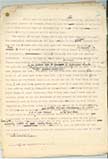 Lady Gregory (1852-1932). “The Epics,” typescript.
Lady Gregory (1852-1932). “The Epics,” typescript.
This is a draft of a section of Lady Gregory’s memoirs, 1900-1903, covering the beginning of her career as a writer, the Gaelic Revival, her decision to put together an English version of the Cuchulain legend, and discussions with W. B. Yeats, Edward Martyn, George Russell (Æ), and others. Courtesy of Leonard L. Milberg.
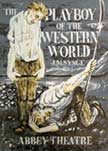 John Millington Synge (1871-1909). The Playboy of the Western World. Dublin: Abbey Theatre, [1980?].
John Millington Synge (1871-1909). The Playboy of the Western World. Dublin: Abbey Theatre, [1980?].
When The Playboy opened at the Abbey Theatre on January 29, 1907, the performance was sold out. During the second act, the audience began to hiss and then yell, responding to the character of Christy Mahon, who, among other things, uses the word “shifts” to refer to women’s undergarments. Riots continued at performances throughout the next week.
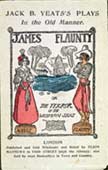 Jack B. Yeats (1871â??1957). James Flaunty, or The Terror of the Western Seas. London: Elkin Mathews, 1901.
Jack B. Yeats (1871â??1957). James Flaunty, or The Terror of the Western Seas. London: Elkin Mathews, 1901.
The English toy theater—sold for “a penny plain and two-pence colored”—grew out of the Regency trade in prints, toys, and novelties sold in the shops around Covent Garden. Jack Yeats and his wife created similar miniature stages, with painted cardboard scenes and figures, for children. Three of them, James Flaunty, The Treasure of the Garden (1902), and The Scourge of the Gulph (1903), were published by Yeats’s friend Elkin Mathews.
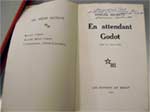 Samuel Beckett (1906-1989). En attendant Godot [Waiting for Godot], pièce en deux actes. [Paris]: Éditions de Minuit, 1952.
Samuel Beckett (1906-1989). En attendant Godot [Waiting for Godot], pièce en deux actes. [Paris]: Éditions de Minuit, 1952.
First edition of Beckett’s play, one of 35 large paper copies signed by Beckett. Courtesy of Leonard L. Milberg.
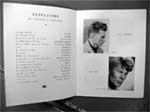 Jean-Marie Serreau présente En attendant Godot de Samuel Beckett: Mis en scène de Roger Blin, playbill. Paris: Théâtre de Babylone, [1953]
Jean-Marie Serreau présente En attendant Godot de Samuel Beckett: Mis en scène de Roger Blin, playbill. Paris: Théâtre de Babylone, [1953]
Playbill for the first production of Waiting for Godot.
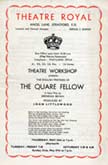 Brendan Behan (1923-1964). The Quare Fellow, playbill. [London]: Theatre Workshop, 1956.
Brendan Behan (1923-1964). The Quare Fellow, playbill. [London]: Theatre Workshop, 1956.
In 1954 Behan’s play The Quare Fellow was first produced at the Pike Theatre in Dublin. However, it was the 1956 production at Joan Littlewood’s Theatre Royal in Stratford, East London, which brought Behan international celebrity.
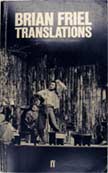 Brian Friel (b. 1929). Translations. London: Faber & Faber, 1981.
Brian Friel (b. 1929). Translations. London: Faber & Faber, 1981.
Translations was the first production of the Field Day Theatre Company, and opened in the Guildhall, Derry, on September 23, 1980. The company was founded by the playwright Friel and actor Stephen Rea.
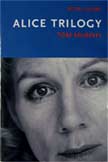 Thomas Murphy (b. 1935). Alice Trilogy. London: Methuen, 2005.
Thomas Murphy (b. 1935). Alice Trilogy. London: Methuen, 2005.
Murphy’s first successful play, A Whistle in the Dark, was performed at the Theatre Royal, Stratford East in London in 1961. His latest work, the Alice Trilogy, had its world premiere at the Royal Court in London in November 2005.
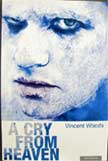 Vincent Woods (b. 1960). A Cry from Heaven. London: Methuen Drama, 2005.
Vincent Woods (b. 1960). A Cry from Heaven. London: Methuen Drama, 2005.
Woods worked as a journalist with the Irish national broadcasting company until 1989, when he began writing full-time. He has received numerous awards, including the Stewart Parker Award for Drama, 1993, the PJ O’Connor Award for Radio Drama, and the M.J. McManus Award for Poetry.
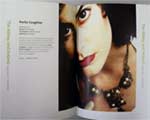 Marina Carr (b. 1964). Portia Coughlan, program in Abbey One Hundred. Dublin: Abbey Theatre, 2004.
Marina Carr (b. 1964). Portia Coughlan, program in Abbey One Hundred. Dublin: Abbey Theatre, 2004.
In this contemporary tragedy, Portia is a young wife and mother who can’t stop thinking about her twin brother Gabriel who drowned himself fifteen years ago. The play premiered at the Abbey Theatre on March 27, 1996 and came to Princeton’s McCarter Theatre in January 1999.
 Irish postage stamps featuring four Irish Nobel laureates: Seamus Heaney, William Butler Yeats, Samuel Beckett, and George Bernard Shaw, released on October 1, 2004.
Irish postage stamps featuring four Irish Nobel laureates: Seamus Heaney, William Butler Yeats, Samuel Beckett, and George Bernard Shaw, released on October 1, 2004.
Gift of J. Howard Woolmer.
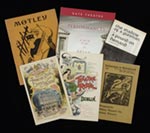 Various playbills from the Milberg Irish Theater Collection.
Various playbills from the Milberg Irish Theater Collection.
